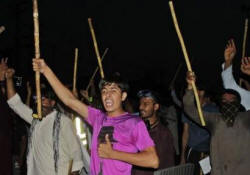|
 Pakistani
police and protesters clash, four dead, 500 arrested Pakistani
police and protesters clash, four dead, 500 arrested
 Send a link to a friend
Send a link to a friend
[August 09, 2014]
By Mubasher Bukhari and Asim Tanveer
LAHORE/MULTAN Pakistan (Reuters) -
Violence flared in several towns and cities in Pakistan on Saturday
between police and supporters of an anti-government cleric, killing at
least four people and injuring scores, police and witnesses said.
|
|
 Activist cleric Tahir ul-Qadri called off a large protest rally
planned in Lahore on Sunday. Following a police crack down, he urged
supporters to hold smaller protests in their home towns instead. Activist cleric Tahir ul-Qadri called off a large protest rally
planned in Lahore on Sunday. Following a police crack down, he urged
supporters to hold smaller protests in their home towns instead.
"Pick up the bodies of the martyred and keep the bodies of the
injured before you - but protest peacefully," Qadri said in a
televised address. "The government wants a massacre in the name of a
crackdown." The violence, which started on Friday, exacerbated
tensions ahead of the Lahore demonstration. Qadri had planned to
protest against deadly clashes between his supporters and police in
June.
He has also condemned the government as corrupt and called for the
overthrow of Prime Minister Nawaz Sharif.
A separate protest, led by opposition politician Imran Khan, is
planned for the capital on Thursday to protest alleged election
irregularities. He has also called for the government to go.
The planned demonstrations have unnerved Sharif's fledgling civilian
government. The nuclear-armed nation of 180 million has a history of
coups and street protests.

Some members of the ruling party fear the protesters may be getting
support from elements in the powerful military, which has had a
series of disagreements with the government. The military denies
meddling in politics.
Security was tight in Lahore on Saturday with police manning
checkpoints throughout the eastern city, the home town of both Qadri
and the prime minister, and the capital of Punjab, the country's
richest province.
Around 500 Qadri supporters had been arrested, said Nabeela
Ghazanfar, the provincial police spokeswoman, and more than 100
police injured. The paramilitary Rangers force patrolled the
streets.
Rahiq Abbassi, a spokesman for Qadri, said more than a hundred of
their supporters were also injured and denied they had attacked the
police.
In several parts of Punjab, police tried to block Qadri's supporters
from traveling to Lahore, sparking confrontations and violence,
police and witnesses said.
Two men and a woman were killed in the district of Gujranwala, about
220 km (140 miles) southeast of Islamabad, said deputy inspector
general of police Saad Bahrwana.
Shopkeeper Muhammad Hussain said those clashes began when police
tried to stop Qadri supporters from traveling to Lahore.
Another man was shot dead during clashes between Qadri supporters
and police in the town of Bhakkar, 320 km southwest of the capital,
said a doctor.
Police said a police station had been burnt down and dozens of
weapons seized in the central town of Qaidabad.
[to top of second column] |

ARRESTS
In Lahore, Qadri's supporters on Friday tried to remove barricades
that authorities put up around Qadri's house, sparking clashes.
The supporters brought a crane to move shipping containers blocking
off the residence and threw stones at police who tried to stop them
by firing teargas. Police withdrew and women activists armed with
batons surrounded Qadri's house.
The clashes continued through Friday night into Saturday.
Provincial law minister Rana Mashhood Ahmad told Reuters on Friday
Qadri would be arrested and charged with terrorism offences for
inciting violence.
Underscoring the worry about political stability are indications the
military is frustrated with the government. Some officers are
unhappy after former military chief and ex-President Pervez
Musharraf was put on trial for treason last year.
Musharraf deposed Sharif, in a coup in 1999 but was forced to step
down in 2008. Sharif returned from exile shortly afterwards and won
a landslide victory in last year's polls.
There was also disagreement between the government and the army on
how to handle militants attacking the state, with the army favoring
military action and the government holding out hope for peace talks.
The army eventually won the argument and launched an offensive in
June.
The military has ruled Pakistan for about half its history but is
generally seen as reluctant to seize power and take on
responsibility for a struggling economy and other problems. But
excessive violence on the streets could force the military to step
in to restore order.

Last week, the government deployed the military around key
installations in Islamabad and on Friday it banned gatherings of
more than five people in the city.
(Additional reporting by Mehreen Zahra-Malik in Islamabad; Writing
by Katharine Houreld; Editing by Robert Birsel and Sophie Hares)
[© 2014 Thomson Reuters. All rights
reserved.] Copyright 2014 Reuters. All rights reserved. This material may not be published,
broadcast, rewritten or redistributed. |